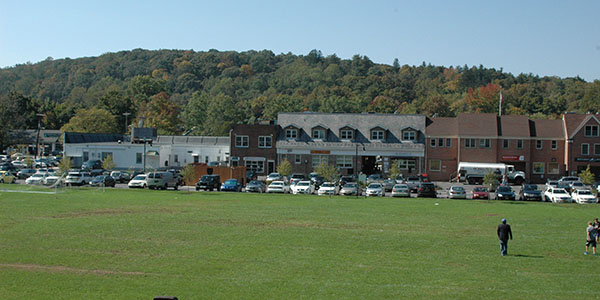 If architect Chuck Napoli has his way, downtown Chappaqua will be radically reshaped.
If architect Chuck Napoli has his way, downtown Chappaqua will be radically reshaped.
Napoli, a Chappaqua resident, has proposed a $15 million to $20 million, 68,000-square-foot project of 20 retail stores, with a residential development proposed on what is now the parking lot behind stores on South Greeley Avenue that would extend into Bell”™s Middle School field, which would be used as a carport. A brand new turf field for Bell Middle School would be above the carport.
The idea is still in the early planning stages. Napoli is making a presentation Oct. 16 at the New Castle Town Board meeting. He would need approval and permission from the school district, the town, and the owners of the stores on South Greeley before he could proceed.
Napoli”™s plan is nothing new and was not initially his. The proposal has been kicked around the town since 1985, and was even mentioned in the town”™s master plan of 1989. Another downtown plan in 1995 mentioned the proposal, though nothing has ever come forward.
Many residents have complained that downtown Chappaqua is sorely lacking in merchants and places to shop, compounded by the town being a bedroom community. Residents have been critical of a possible rezoning that would allow a supermarket and other retailers at the Chappaqua Crossing site, fearing it would cripple the downtown.
“I”™m using this project as a model for community development,” Napoli said. “I”™ve had meetings once a week all summer long. I”™ve been listening to people. We”™re a very walkable hamlet. The trick is to have enough businesses to draw people.”
Napoli has been to many hearings on development projects, including Chappaqua Crossing, which has devolved into yelling and lawsuits. Napoli, who himself was a proponent against repairs to the Route 120 bridge and filed an unsuccessful lawsuit, said it is important that he builds consensus and support in the community.
The project has stalled in the last 27 years because of a lack of cooperation between the school and town board. Napoli claims neither side got along until recently, and praised Supervisor Susan Carpenter for reaching out to the school board.
“Susan is interested in bringing new stores into town and expanding the non-residential tax base,” Napoli said. “Because of her, now everyone is talking.”
Carpenter did not respond to multiple requests for comments.
Residents expressed support for the plan, hoping that it will reinvigorate the downtown.
“I think it”™s a terrific idea,” said resident Tom Curley, an architect and urban designer for more than 40 years. “If there is more that downtown can provide which is complimentary to existing businesses, something which is going to be useful and will add to the quality of life of people, it”™s hard to argue that it shouldn”™t happen.”
Dave Metz, a longtime Chappaqua resident, said that the downtown is terribly lacking.
“I don”™t think you”™ll find anyone who disagrees,” Metz said. “This project is good for parking, it”™s good for recreation and it”™s a boon for the stores. I don”™t think Chappaqua is a viable commercial center, but it”™s important that it might become one.”
The vision that Napoli, who is teaming with construction manager Mark Giordano of Ossining, has is turning Chappaqua into a charming European town where pedestrians and cars don”™t mix. Napoli will control the stores that go in there, and said he is not looking for chains. Besides Europe, a local comparison he has is Katonah.
“I want to keep that small town feel attitude,” Napoli said. “The trick is to have a place for cars and people and just don”™t have them mix.”
Part of the project will include the construction of a 360-seat performing arts center. After seeing what centers like the Jacob Burns Film Center in Pleasantville, Tarrytown Music Hall and Irvington Town Hall have done to their communities, Napoli would like to see Chappaqua have its own place.
The performing arts center would be built and donated by Napoli to a not-for-profit organization that would run it.
“We need people using the town in the evening,” Napoli said. “We have people here during the day, just not after six.”
The Chappaqua School District plays a major role in the project. Napoli said while there would be inconvenience as he builds one field and puts a carport on the other, he would try to do everything over the summer to minimize impact. And aging Bell Field would be replaced by a gleaming turf field, also donated by Napoli.
Napoli said he is working with the school right now though he has not formally proposed anything, and that the district is investigating the legalities of the project. Victoria Tripp, president of the Chappaqua Board of Education, said that the district is open to Napoli”™s proposal.
“The Chappaqua school board is in favor of supporting commercial development and existing businesses in our town,” Tripp said. “Having a vibrant and economically sound business district would benefit all segments of our community.”
Napoli said he has support for the project and that many storeowners have not only given their permission, but asked to be investors. He said other Chappaqua residents have asked about investing.
Once Napoli has all his approvals and money in place, he said the project would take about 40 months to complete. Rent for businesses would be about $35 per square foot, and while the project would not fill Chappaqua”™s need for a supermarket, Napoli said he would like a specialty food market, similar to the Grand Central Market.
The 20 apartments would likely have little impact on the Chappaqua School District as they would be one bedroom or studio. Napoli envisions them for a young couple just starting out in Chappaqua or older people looking for a place to stay.
The project should create 80 jobs during the construction phase and Napoli estimates 190 full-time jobs once it is completed.
Napoli”™s architecture has become almost an institution in the hamlet since he moved to Chappaqua in 1970. He has designed more than 42 projects, up and down the King Street hill. He said he has been before the planning board more than 45 times.
Despite Chappaqua”™s status as a bedroom community, Napoli notes that there are a lot of empty nesters and homemakers that could keep the shops thriving during the day.
















